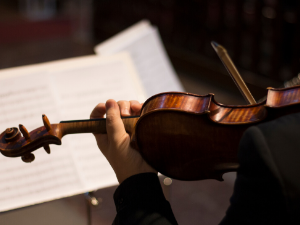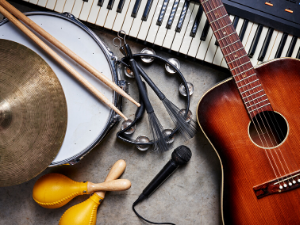RCM Exams: Your Complete Guide
April 8, 2020 by Taras (Terry) Babyuk
Table of Contents
What is RCM?
RCM stands for Royal Conservatory of Music, which was founded in Toronto, Canada in 1886 and prides itself on being one of the largest and most respected music-education institutions in the world. RCM offers a variety of exams as part of its popular “Certificate Program”. These exams evaluate students' proficiency on a musical instrument or knowledge of music-related concepts and topics. Students who successfully pass their exams receive an official certificate recognizing their achievement. RCM certificates are well-regarded and widely-recognized as being an objective and reliable measure of a student's musical proficiency. According to RCM, more than 100,000 of their exams are taken every year across North America.

Types of RCM Exams
Practical Exams

Practical exams are mostly about your ability and expertise on your instrument. They are usually done one-on-one with an examiner and can take place either in-person or (since Covid-19) online through Zoom. Practical exams generally consist of four parts: “repertoire”, “technical requirements”, “ear tests” and “sight reading”, but the exact structure can differ depending on the instrument and level.
1. Repertoire - for this part, students are required to perform a set number of musical pieces, each representing a different style and musical period. Each piece can be chosen from a wide selection of options that RCM provides. The higher the student's level, the more pieces they must perform and the bigger their complexity. This is the longest part of the exam.
2. Technical Requirements - designed to complement the demands of the repertoire, this part is sub-divided into “technical tests” and “etudes”. Technical tests are things like scales, chords, and arpeggios, which are meant to develop students' technical prowess and finger dexterity. Etudes are shorter musical pieces designed to develop a specific technical skill within a musical context.
3. Ear Tests - this part of the practical exam involves almost no playing on the part of the student. Instead, the the student is asked to listen to and correctly identify things like intervals, chord qualities, and chord progressions, which are played by the examiner. Students are also required to listen to a short melody and then play it back to the examiner.
4. Sight Reading - this is where students are given a musical excerpt that they have (hopefully) never encountered before. After clapping the rhythm of a short passage from this excerpt, they must then play the whole excerpt. As a general rule, the difficulty level of the sight-reading excerpt is 3 levels below the level for which you are doing the exam. So for a level 6 exam, the sight-reading excerpt will be comparable in difficulty to RCM level 3.
Written Exams
These exams take place either in arcm exams - written classroom setting with a supervisor or online on your computer. The most common written exams are “theory”, “history”, and “harmony”.
1. Theory - these exams test students' knowledge of the building blocks of music and include topics such as major and minor scales, chords, intervals, rhythm, transposition, etc.

2. History - as the name suggests, history exams test students' knowledge of important dates, musical eras and developments associated with each one, biographical information of well-known composers, etc. Expect to do plenty of memorizing here.
3. Harmony - harmony is what happens when many sounds come together. On this exam, students are tested on their knowledge of concepts such as counterpoint, chord progressions, harmonization, cadences, modulations, phrase structures, compositional techniques, and more.
List of RCM Exams
Practical Exams
Note: exams and exam names might differ from instrument to instrument. For purposes of demonstration, the following list is for piano. To see a list of practical exams for other instruments, download the appropriate syllabus from the RCM website by clicking here.
| Exams (piano only example) |
|---|
| Preparatory A |
| Preparatory B |
| Level 1 |
| Level 2 |
| Level 3 |
| Level 4 |
| Level 5 |
| Level 6 |
| Level 7 |
| Level 8 |
| Level 9 |
| Level 10 |
| Associate Diploma (ARCT) in Piano, Performer |
| Associate Diploma (ARCT) in Piano, Pedagogy |
| Licentiate Diploma (LRCM) in Piano, Performer |
Source: RCM Piano Syllabus, 2022 Edition
Written Exams
Note: this list only includes exams that are part of the “Celebrate Theory” book series (and are also the most popular). You can find more exams in the “RCM Exam Fees” section. Keep in mind that Preparatory to Level 4 theory levels are not tested with formal examinations.
| Exams |
|---|
| Level 5 Theory |
| Level 6 Theory |
| Level 7 Theory |
| Level 8 Theory |
| Level 9 Harmony |
| Level 9 History |
| Level 10 Harmony & Counterpoint |
| Level 10 History |
| ARCT Harmony & Counterpoint |
| ARCT History |
| ARCT Analysis |
Source: RCM Theory Syllabus, 2016 Edition
List of Instruments Offered

| Accordion |
| Bassoon |
| Cello |
| Clarinet |
| Classical guitar |
| Double bass |
| Euphonium |
| Flute |
| Harp |
| Harpsichord |
| Horn |
| Oboe |
| Organ |
| Percussion |
| Piano |
| Recorder |
| Saxophone |
| Speech arts and drama |
| Theory |
| Trombone |
| Trumpet |
| Tuba |
| Viola |
| Violin |
| Voice |
Source: The Royal Conservatory
How Long Are RCM Exams?

Practical Exams
RCM does not specify exact length for its practical exams, but they generally go anywhere from 15 minutes for beginner levels to over 1 hour for the advanced levels.
Written Exams
Written exams have time limits and students must finish their exam within the allotted time.
| Exam | In-Person | Online |
|---|---|---|
| Level 5 Theory | 1 hour | 1 hour |
| Level 6 Theory | 2 hours | 1 hour |
| Level 7 Theory | 2 hours | 1 hour |
| Level 8 Theory | 2 hours | 1 hour |
| Level 9 Harmony | 3 hours | not available |
| Level 9 History | not available | 70 minutes |
| Level 10 Harmony & Counterpoint | 3 hours | not available |
| Level 10 History | not available | 110 minutes |
| ARCT Harmony & Counterpoint | 3 hours | not available |
| ARCT History | not available | 150 minutes |
| ARCT Analysis | 3 hours |
For all other exams and up-to-date information on this topic, please visit the RCM website at this link
RCM Exam Dates
Remote (online) Exams
Remote exams can be booked on a continuous basis. You can register for a Remote Exam from your RCM account.
In-Person Exams (2023-2024)
| AUGUST 2023 SESSION | |
|---|---|
| Registration Opens | April 4, 2023 |
| Registration Deadline | June 6, 2023 |
| Theory Examinations | August 11 & 12, 2023 |
| Practical Examinations | August 14 - 26, 2023 |
| DECEMBER 2023/JANUARY 2024 SESSION | |
|---|---|
| Registration Opens | September 12, 2023 |
| Registration Deadline | November 7, 2023 |
| Theory Examinations | December 8 & 9, 2023 |
| Practical Examinations | January 15 - 27, 2024 |
| APRIL 2024 SESSION (PIANO ONLY) | |
|---|---|
| Registration Opens | November 14, 2023 |
| Registration Deadline | January 9, 2024 |
| Theory Examinations | not available |
| Practical Examinations | April 15 - 20, 2024 |
| MAY/JUNE 2024 SESSION | |
|---|---|
| Registration Opens | January 16, 2024 |
| Registration Deadline | March 5, 2024 |
| Theory Examinations | May 10 & 11, 2024 |
| Practical Examinations | June 3 - 22, 2024 |
Source: RCM Examination Dates - Canada
For more Exam dates, please visit RCM website at this link
For US dates, please visit RCM website at this link
RCM Exam Fees
The below are Canadian fees. For US fees, click here
The fees below are up to date as of September 2023.
Practical Exam Fees
| Exam | Fee |
|---|---|
| Preparatory (non-piano) | $66 |
| Preparatory A | $66 |
| Preparatory B | $66 |
| Level 1 | $107 |
| Level 2 | $131 |
| Level 3 | $159 |
| Level 4 | $169 |
| Level 5 | $190 |
| Level 6 | $205 |
| Level 7 | $217 |
| Level 8 | $274 |
| Level 9 | $310 |
| Level 10 | $495 |
| Level 10 Split: Repertoire Only | $345 |
| Level 10 Split: Technique, Ear Tests, and Sight Reading | $345 |
| Level 10 Split: Technique, Orchestral Excerpts, Ear Tests, and Sight Reading | $345 |
| ARCT Performer | $825 |
| ARCT Teacher (non-piano) | $809 |
| ARCT Teacher Part 1 (non-piano) | $510 |
| ARCT Teacher Part 2 (non-piano) | $510 |
| Elementary Piano Pedagogy | $433 |
| Intermediate Piano Pedagogy | $453 |
| Advanced Piano Pedagogy Practical | $572 |
| Advanced Piano Pedagogy Viva Voce | $572 |
| Licentiate - Piano Performance | $999 |
| Level 9 Keyboard Harmony | $206 |
| Level 10 Keyboard Harmony | $232 |
| ARCT Keyboard Harmony | $284 |
Written Exam Fees
| Exam | Fee |
|---|---|
| Level 5 Theory | $139 |
| Level 6 Theory | $149 |
| Level 7 Theory | $159 |
| Level 8 Theory | $175 |
| Level 9 Harmony | $206 |
| Level 9 History | $206 |
| Level 10 Harmony & Counterpoint | $232 |
| Level 10 History | $232 |
| ARCT in Composition & Theory | $960 |
| ARCT Harmony & Counterpoint | $283 |
| ARCT Analytic Techniques | $283 |
| ARCT History | $283 |
| ARCT Teachers Written | $283 |
| Elementary Piano Pedagogy Written | $195 |
| Intermediate Piano Pedagogy Written | $215 |
| Advanced Piano Pedagogy Written | $283 |
| Academic Qualifying Exam | $965 |
| Aural Skills | $265 |
| Baroque Harmony & Counterpoint I | $272 |
| Baroque Harmony & Counterpoint II | $272 |
| Classical Harmony & Counterpoint | $272 |
| Music History after 1900 | $272 |
| Music History up to 1900 | $272 |
| Orchestration I | $272 |
| Orchestration II | $272 |
| Post-1900 Composition Techniques | $272 |
| ARCT in Composition | $963 |
| ARCT in Theory | $963 |
| Romantic and Post Romantic Harmony and Counterpoint | $272 |
Source: The Royal Conservatory
For most up-to-date information on fees, visit RCM website at this link
How Are RCM Exams Graded?
Practical Exams
Mark breakdowns for each section can differ depending on the instrument (and exam type), but Repertoire is by far the most important part across all instruments, worth at least 50% of the total exam mark.
To give you an idea of how a typical RCM exam is broken down, here is an example from a Grade 5 piano exam, since piano is the most popular instrument among exam takers.

Repertoire: students are required to perform a total of 3 pieces and can earn 2 extra marks per piece if they have it memorized. A maximum of 56 marks can be earned for this section.
Technical Requirements: includes technical tests and 2 etudes. Note that no memory marks are given for the etudes, which means students can have their sheet music in front of them while playing if they wish. A maximum of 24 marks are given for this section.
Ear Tests and Sight Reading: fall under the “Musicianship” component of the test and are worth 10 marks each, for a combined total of 20.
The exam is out of 100, with 60 being the passing grade.
Starting at level 5, students must also write a co-requisite theory exam if they wish to earn a Comprehensive Certificate for their particular level. For level 5, the co-requisite theory exam is Level 5 Theory.
To view requirements for all RCM Piano Levels, click here
Written Exams
Here is an example of one of my past exams, which is equivalent to what is today “Level 6 Theory” (yes, I was a theory nerd).
As we can see, the mark is out of 100, with 10 marks given for each of the topics on the left.
Keep in mind that topics/questions might be different depending on which theory level exam you are writing.
The passing grade is 60.
Classification of Exam Marks
This is how RCM classifies your score
| FIRST CLASS HONORS WITH DISTINCTION | 90 - 100% |
| FIRST CLASS HONORS | 80 - 89% |
| HONORS | 70 - 79% |
| PASS | 60 - 69% |
| FAIL | 0 - 59% |
When are RCM Exam Results Posted?
Practical & Written Exams
Marks:
1-2 weeks after the examination
Official results and examiner's comments:
4-6 weeks after the examination
RCM Exams and High School Credits
High school students in Canada can earn credits with RCM exams. In Ontario, students can earn 2 out of the 30 credits required to graduate by successfully passing the RCM Gr. 7 and Gr. 8 practical exams along with their theory co-requisites. For information on other provinces, click here.
For US test takers, it is up to each state/school board to decide whether to count RCM examinations towards high school credits, so check with your school.
RCM Contact Information
CANADA
Phone: (416) 408-5019 or 1-800-461-6058
Fax: (416) 408-3151
Email: candidateservices@rcmusic.ca
Address: 273 Bloor St W, Toronto, ON M5S 1W2
UNITED STATES
Phone: 1-866-716-2223
Fax: 1-866-716-2224
Email: usaccountservices@rcmusic.ca
Address: 60 Industrial Parkway, Suite 882, Cheektowaga, NY, 14227-2713 USA
Just fill out our quick trial lesson form and wait to hear from us within 1-2 business days. If you like your trial lesson, you can sign up for regular lessons with us! Our lessons are available online (Zoom or Skype) as well as in-person if you live close to our location. Start learning your favorite instrument with one of our amazing teachers today!
